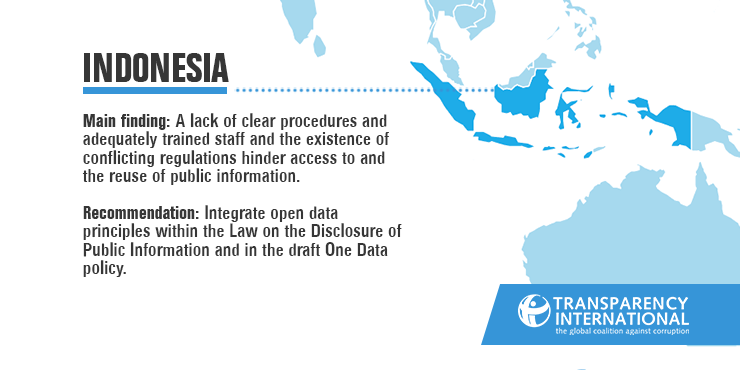
On 21 March, the Web Foundation’s Open Data Lab Jakarta, together with Transparency International Indonesia and Open Government Indonesia, and with the support of Ford Foundation is holding a roundtable discussion on “Open Data and the Fight Against Corruption in Indonesia”. The event will be held at the Office of the President in Jakarta, Indonesia, with representatives from civil society, government, and the academia coming.
The dialogue will focus on the recently released research that shows five key G20 countries – including Indonesia – have failed to meet their commitments to tackle corruption through the publication of open government data. This dates back to 2015, when the G20 agreed that governments should publish government data as open data—which would allow citizens to better monitor the flow of government funds, allocation of public resources, procurement activities and trace the financial sources of political campaigns, thereby helping curb corruption.
Fighting Corruption in Indonesia
Corruption in Indonesia has taken diverse and complex forms. It has been estimated that such crime has cost the government as much as IDR 31,077 trillion in losses annually. As such, efforts to promote more open and accountable governance have increased in the past decade. Most often, these approaches have sought to leverage elements of transparency and information along with some form of citizen engagement or participation, with the goal of influencing government actions to be more responsive and accountable.
Why Open Data?
Open data is emerging as an important tool in the fight against corruption. If government data is published as open data , it could lead to increase in transparency of government activities, budgets and expenditure for citizens, allowing for various accountability interventions.
In 2015, the G20 Anti-Corruption Open Data Principles were developed as a first step towards leveraging open data as a crucial tool to enable a culture of transparency, accountability and access to information and prevent corruption. At that time, the G20 agreed that the principles should be based on the International Open Data Charter, which focuses on enhanced access to, and the release and use of government data, so as to strengthen the fight against corruption. The question now is, have the countries met their commitment?
The assessment
This study jointly carried out by Transparency International and the Web Foundation, assessed the extent to which a select group of G20 countries, namely Brazil, France, Germany, Indonesia and South Africa, have met their commitments to fight corruption by applying and implementing the G20 principles and actions.
The research findings show that the government of Indonesia puts the disclosure of public information at the front and centre of both its open government and anti-corruption agenda. The country has comprehensive legal and institutional frameworks that guarantee citizen rights to access public information. Nevertheless, the lack of clear procedures and adequately trained staff and the existence of conflicting regulations hinder both access to and the reuse of public information. Apart from the budget, company register and public procurement data, access to key anti-corruption datasets remains limited.
For open data to make a significant impact on anti-corruption activities in Indonesia, there must be a concerted effort to create and foster an environment in which open data can be actively used as a tool for anti-corruption.. Such an effort will require the strengthening of the institutional framework, improving data governance and management practices and engaging citizens in the process.
About the Event
The event focuses on discussions of the report findings, and also a quick workshop to identify opportunities for further research, advocacy, and innovation. If you wish to find out more about the event or discuss the Indonesian report, email Glenn Maail (glenn@webfoundation.org) or follow us on Twitter @ODLabJkt as we tweet directly from the event.
You can learn more about the Jakarta Lab’s activities by visiting our projects page and blog, and discover our innovative models and approaches through our resources.
Event Agenda
| Time | Activity |
| 12:30 – 13:00 | Registration |
| 13:00 – 13:10 | Welcome Remarks |
| 13.10 – 13.25 | Background of the G20 AC Open Data Research |
| 13.25 – 13.40 | Presentation of the result of the G20 AC Open Data Research of Indonesia |
| 13:40 – 14:00 | Q&A |
| 14:00 – 15:15 | Workshop: Opportunities for Research, Advocacy, and Innovation The workshop will focus on the areas of:
|
| 15:15 | Closing Remarks |
Leave a Reply